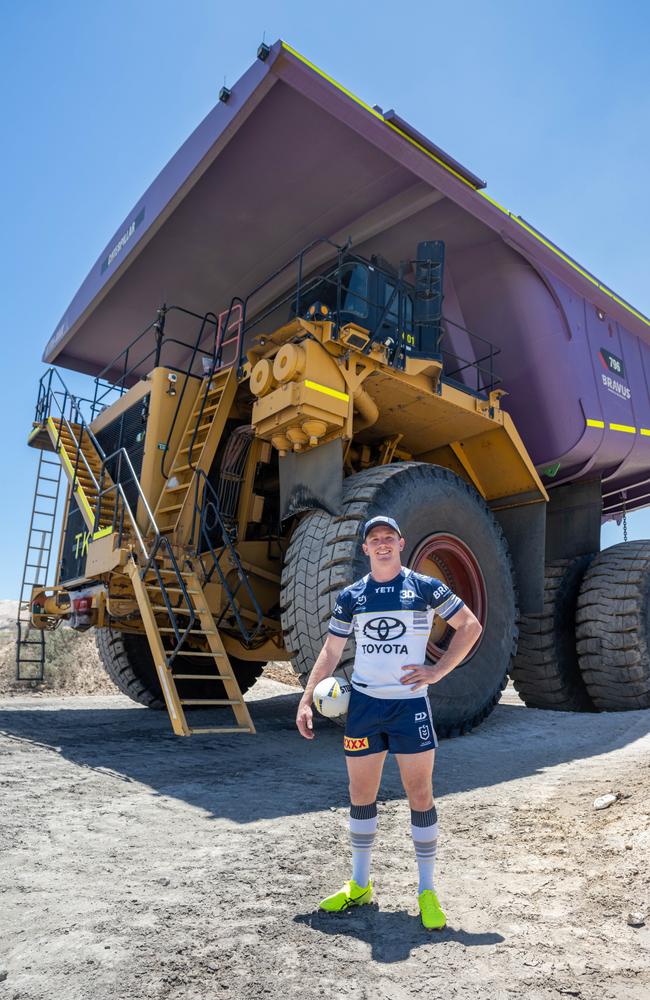Dale Last: Coal demand hitting record high, NQ set to reap the benefits
North Queensland’s coal export industry is set to enjoy a strong future, with demand for the precious resource continuing to climb across the world as the Townsville region positions itself as a key distributor.

Townsville
Don't miss out on the headlines from Townsville. Followed categories will be added to My News.
This year’s Future Townsville series, in partnership with S.Kidman, Bravus, Port of Townsville, Aurizon, Queensland Resources Council and Sun Metals, will examine the once-in-a-generation opportunities for trade and investment in this city.
North Queensland’s coal export industry is set to enjoy a strong future, with demand for the precious resource continuing to climb across the world as the Townsville region positions itself as a key distributor.
Minister for Natural Resources and Mines Dale Last said last year alone, India’s demand for coal hit a “record high” with consumption across Southeast Asia rising by nearly eight percent.
“Strong global demand for Queensland’s world-class coal is forecast to continue for many years to come,” Mr Last said.
“There are more than 400 coal-fired power stations under constructions around the world, mostly in India, China and Southeast Asia – Queensland’s key export markets.”
Mr Last said his government were committing to delivering “a better approval system”.
CEO of Townsville Enterprise Limited (TEL), Claudia Brumme-Smith echoed this sentiment and said it’s a resource used to “power emerging economies such as India and China”.

“These countries alone account for more than 50 per cent of global coal use, and demand will continue as they industrialize further and raise their populations out of poverty,” she said.
“Global demand for coal is strong, and a country like Australia – with our incredible resources, skill workforce and excellent operating conditions – is primed to meet and benefit from this demand.”
Its intense demand in growing countries has led to a major economic boost in the state, with Queensland Resources Council (QRC) CEO Janette Hewson saying it generated $85 billion for the state which supported 390,000 jobs last year.
A spokesman for Bravus Mining and Resources said the trends into the near-future looked set to continue the run of strong demand.
“Global energy demand is increasing, not decreasing. According to the International Energy Agency (IEA), of which Australia is a member, global demand for coal for electricity and to make steel is still rising and is yet to plateau,” he said.
“Both global steel and electricity demand is forecast to increase, driven by urbanisation and economic development underway in developing economies, particularly India and others in south-east Asia, and by the uptake of AI around the world.”
At the forefront of energy demands are emerging industries, with technology like AI and data centres requiring copious amounts of power in order to function.
“Global data centre electricity consumption has grown by around 12% per year since 2017, more than four times faster than the rate of total electricity consumption (IEA),” the spokesman said.

“Training and deploying AI models takes place in large and power-hungry data centres. A typical AI- focused data centre consumes as much electricity as 100 000 households, but the largest ones under construction today will consume as much as two million households.
“Data centres’ need for reliable power sources is sustaining and increasing demand for electricity generated from coal and gas to complement generation from renewables. This is in addition to the increasing demand from all other sources that is increasing demand for coal.”
TEL’s CEO Ms Brumme-Smith explained that 964 North Queenslanders, most based in Townsville, currently worked in the state’s coal mines.
“We are proud of having them based here in our city, and acknowledge their value to the Queensland economy especially being an employer of 1300 people at the Carmichael Coal Mine.”
Ms Hewson said, “Steelmaking, or metallurgical, coal accounts for 80 per cent of the value of coal produced in Queensland and thermal coal the remaining 20 per cent”.
“Queensland Treasury forecast our steelmaking coal will remain a significant contributor to the state’s economy well beyond 2050 as strong demand continues.

“Demand forecasts in Queensland mirror the estimates from the International Energy (IEA) and market analysts that suggest demand for Queensland’s steelmaking coal will continue to grow in future decades due to its vital role in construction and infrastructure.”
Ms Hewson said that demand for thermal coal has declined in Europe and Australia however it’s continued to rise in the developing countries that rely on coal for energy.
A key part of Queensland’s coal is its commitment to being more environmentally-conscious than most – which, according to Ms Hewson can be a cause for concern if the balance isn’t right.
“Our industry holds a reputation for strict environmental standards, innovative practices, responsible resource management and ambitious sustainability goals,” the QRC CEO Hewson said.
“While our Queensland industry is considered world leading in safety and environmental performance, we must get the right balance, so excessive regulation does not slow down approvals or create unnecessary red tape.
“Our industry is competing with other countries that don’t have the same regulatory burden and we do not receive a premium on price from customers for our higher cost base.”
TEL’S CEO, Ms Brumme-Smith said Queensland was “lucky” to have “high-quality coal” that the world is demanding.
“Coal production in Australia is advantageous over many other nations because, not only do we have some of the world’s highest-quality product that burns cleanly and efficiently when compared to lower grades, we have among the safest operating practices and best industrial relations protections in the world,” she said.
This article is part of the FUTURE TOWNSVILLE series, which was supported by S.Kidman, Bravus, Port of Townsville, Aurizon, Queensland Resources Council and Sun Metals.
Originally published as Dale Last: Coal demand hitting record high, NQ set to reap the benefits







